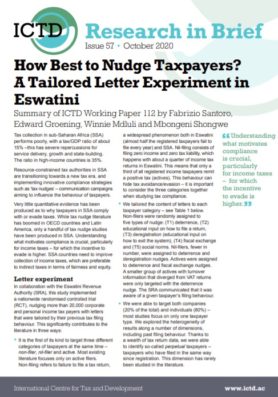Research in Brief 57
Tax collection in sub-Saharan Africa (SSA) performs poorly, with a tax/GDP ratio of about 15% –this has severe repercussions for service delivery, growth and state-building. The ratio in high-income countries is 35%. Resource-constrained tax authorities in SSA are transitioning towards a new tax era, and implementing innovative compliance strategies such as ‘tax nudges’ – communication campaigns aiming to influence the behaviour of taxpayers. Very little quantitative evidence has been produced as to why taxpayers in SSA comply with or evade taxes. While tax nudge literature has boomed in OECD countries and Latin America, only a handful of tax nudge studies have been produced in SSA. Understanding what motivates compliance is crucial, particularly for income taxes – for which the incentive to evade is higher. SSA countries need to improve collection of income taxes, which are preferable to indirect taxes in terms of fairness and equity. This is a summary of ICTD Working Paper 112.
